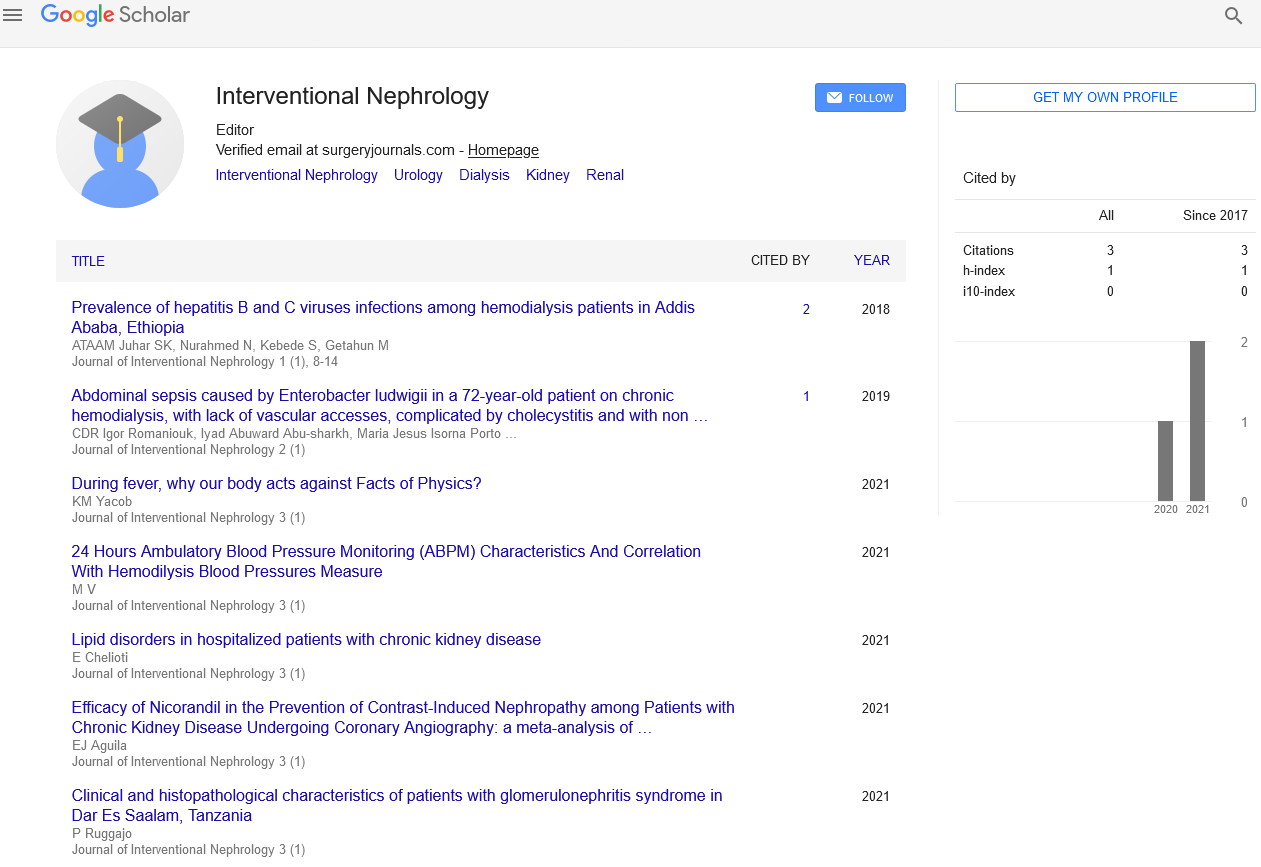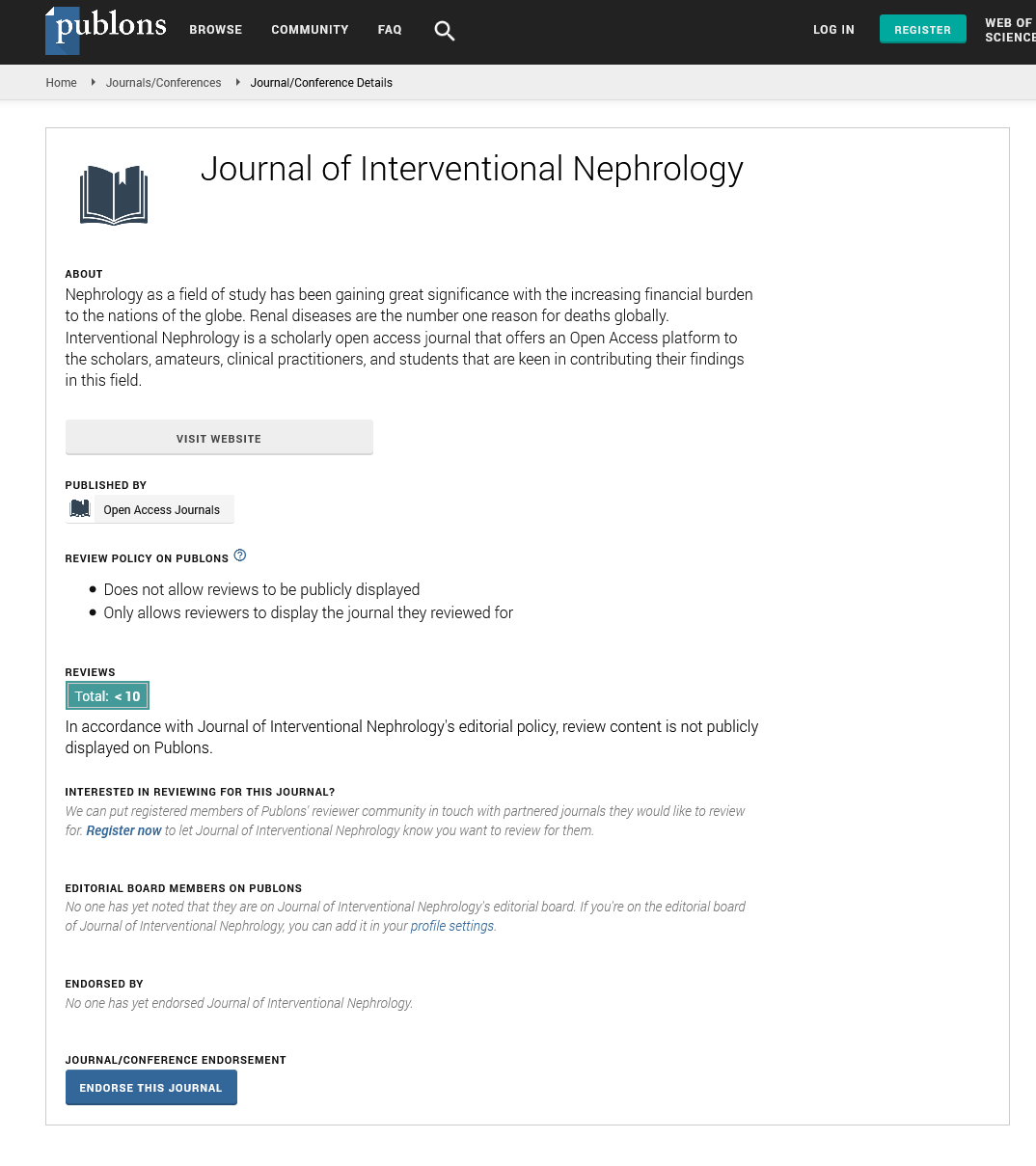Perspective - Journal of Interventional Nephrology (2024) Volume 7, Issue 5
Patient-Centered Care in Interventional Nephrology: Enhancing Outcomes through Empathy and Collaboration
- Corresponding Author:
- Gang Bao
Department of Nephrology,
Emory University,
China
E-mail: JDazhuo001@EN.edu
Received: 29-Jul-2024, Manuscript No. OAIN-24-143617; Editor assigned: 31-Jul-2024, PreQC No. OAIN-24-143617 (PQ); Reviewed: 13-Aug-2024, QC No. OAIN-24- 143617; Revised: 04-Oct-2024, Manuscript No. OAIN-24-143617 (R); Published: 11-Oct-2024, DOI: 10.47532/oain.2024.7(5).308-309
Introduction
Patient-centered care lies at the heart of interventional nephrology, a specialized field dedicated to minimally invasive procedures for kidney-related conditions. This approach prioritizes the individual needs, preferences, and experiences of patients throughout their healthcare journey. By fostering a collaborative and empathetic relationship between healthcare providers and patients, patient-centered care in interventional nephrology highlighting strategies to integrate this approach into clinical practice.
Description
Holistic assessment and individualized treatment plans
• Comprehensive evaluation: Patient-centered
care begins with a thorough assessment
of the patient’s medical history, kidney
function, and individual circumstances.
Understanding the patient’s unique needs
and preferences informs the development
of personalized treatment plans that align
with their goals and values.
• Shared decision-making: Collaborative
decision-making involves engaging patients
in discussions about their treatment
options, risks, and benefits. By empowering
patients to actively participate in decisions
regarding their care, healthcare providers
can ensure that interventions align with the
patient’s preferences and priorities.
Emphasis on patient safety and comfort
Minimizing discomfort: Interventions in
interventional nephrology, such as percutaneous
renal biopsies or dialysis access procedures, can
be daunting for patients. Patient-centered care
emphasizes minimizing discomfort through pain management strategies, sedation when
appropriate, and optimizing procedural
techniques to enhance patient comfort.
• Safety protocols: Ensuring patient
safety is paramount in interventional
nephrology. Adhering to strict infection
control measures, monitoring vital
signs during procedures, and promptly
addressing any complications are essential
components of providing safe care.
Benefits of patient-centered care in interventional nephrology
Improved treatment adherence
• Enhanced patient engagement: Patientcentered
care encourages active participation
in treatment decisions, fostering a sense
of ownership and responsibility for health
outcomes. Patients who feel involved in their
care are more likely to adhere to prescribed
treatments and follow-up recommendations.
• Reduced healthcare utilization: By
promoting treatment adherence and
proactive management of kidney disease,
patient-centered care can help reduce
hospitalizations, emergency room visits,
and complications associated with nonadherence.
Enhanced clinical outcomes
• Optimized treatment outcomes: Tailoring
interventions to meet the individual
needs and preferences of patients can lead
to better treatment outcomes. Patientcentered
care focuses on achieving not only
clinical success but also improvements in
quality of life and overall well-being.
• Personalized management strategies: Understanding the patient’s social support
network, cultural background, and lifestyle factors allows healthcare providers
to develop personalized management
strategies that are effective and sustainable.
Positive patient experiences
• Improved satisfaction: Patients who
receive care that is respectful, responsive,
and patient-centered report higher levels of
satisfaction with their healthcare experience.
Feeling heard and valued by healthcare
providers contributes to a positive
perception of care quality.
• Enhanced quality of life: By addressing the
holistic needs of patients, including their
emotional and psychosocial well-being,
patient-centered care in interventional
nephrology can significantly enhance
quality of life. Supporting patients in
managing symptoms, adapting to lifestyle
changes, and coping with the emotional
impact of kidney disease fosters resilience
and improves overall well-being.
Implementing patient-centered care in practice
Training and education for healthcare providers
• Communication skills: Healthcare providers
should receive training in effective
communication techniques, including active
listening, empathy, and cultural competence.
Continuing education programs can further
enhance these skills and promote patientcentered
care practices.
• Shared decision-making training: Providing
healthcare providers with tools and resources
for shared decision-making empowers them
to engage patients in meaningful discussions
about treatment options and preferences.
Integration of patient feedback and quality improvement
• Feedback mechanisms: Establishing
mechanisms for collecting patient feedback,
such as surveys or focus groups, provides
valuable insights into patient experiences and
areas for improvement. Healthcare teams
can use this feedback to refine practices and
enhance patient-centered care delivery.
• Quality improvement initiatives: Continuous
quality improvement efforts, including regular
review of patient outcomes and adherence to
patient-centered care principles, support the
ongoing evolution of care practices and ensure
alignment with patient needs.
Challenges and future directions
Resource allocation and time constraints
• Balancing priorities: Healthcare providers may face challenges in allocating sufficient time and resources to engage in patientcentered care amidst competing clinical demands. Addressing these challenges requires organizational support and commitment to prioritizing patient-centered practices.
Healthcare technology integration
• Telehealth and virtual care: Integrating telehealth platforms and digital health tools can enhance accessibility to patientcentered care, particularly for remote or underserved populations. Embracing technology enables healthcare providers to maintain continuity of care and support patients’ self-management efforts.
Conclusion
Patient-centered care in interventional nephrology embodies a compassionate and collaborative approach to managing kidney disease. By prioritizing the individual needs, preferences, and experiences of patients, healthcare providers can foster meaningful relationships, enhance treatment adherence, and optimize clinical outcomes. As the field continues to evolve, integrating patient-centered care principles into practice will be essential for delivering holistic, personalized care that empowers patients and improves their quality of life.
In summary, patient-centered care in interventional nephrology is not only a philosophy but also a practice that transforms healthcare delivery by placing patients at the center of decision-making and care planning.


